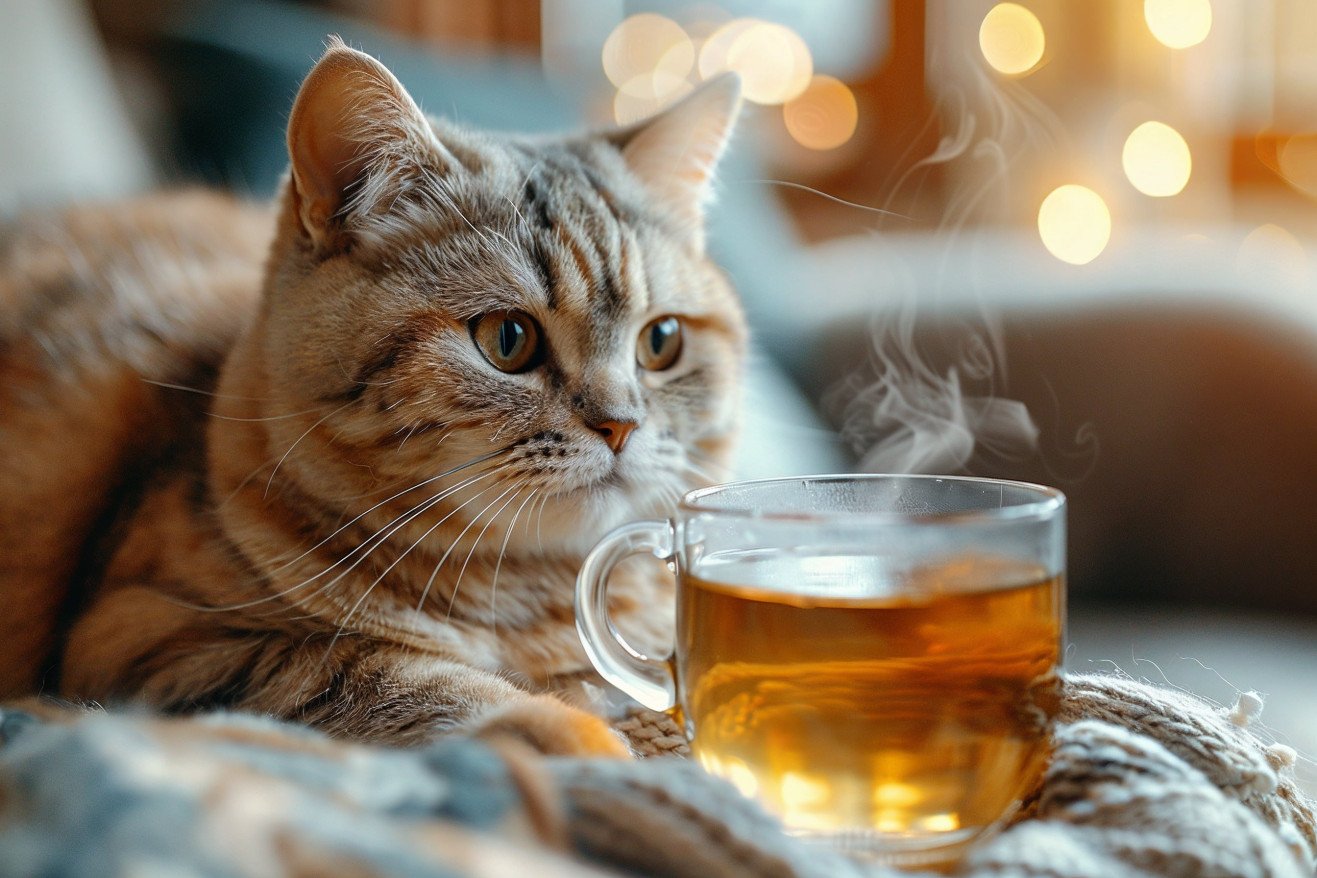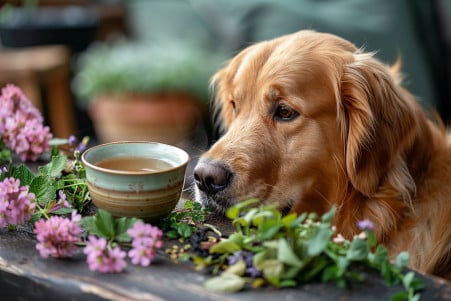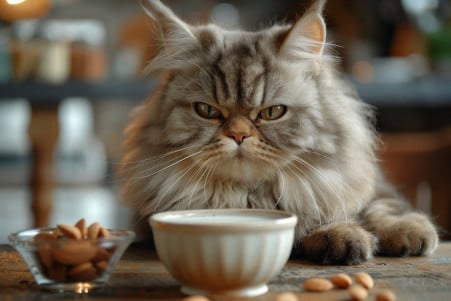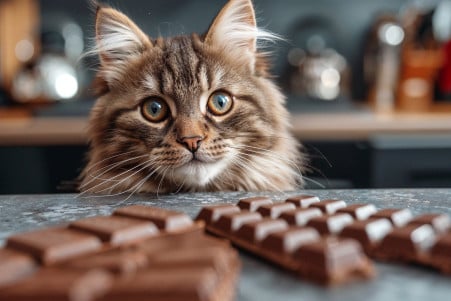Can Cats Drink Tea? Understanding the Risks
21 April 2024 • Updated 21 April 2024

If you’re a cat owner who loves to drink tea, you may have wondered if you can share your favorite beverage with your feline friend. Unfortunately, the answer to the question of whether or not cats can drink tea is a bit complicated and depends on the type of tea and the risks involved. No, cats should not drink tea. Tea contains caffeine and other compounds that can be toxic to cats, potentially causing vomiting, diarrhea, increased heart rate, and other issues. Even herbal, decaffeinated teas may contain cat-unfriendly ingredients, so it's best to stick to fresh water for your cat's hydration needs.
To help answer this question, we’ll look at the findings of veterinary experts, toxicologists, and pet nutritionists who have studied the potential dangers of the various components of tea for cats. By doing so, we hope to make it clear why cats should not drink tea. This way, you can make sure you’re feeding your cat the healthiest, most nutritious diet possible.
Can cats drink tea?
Caffeine Toxicity in Cats: Signs and Potential Dangers
Caffeine is a central nervous system stimulant that can be toxic to cats, even in small amounts. According to the Pet Poison Helpline, cats are more sensitive to caffeine than people. Clinical signs of caffeine toxicity in cats include hyperactivity, restlessness, vomiting, tachycardia (elevated heart rate), hypertension (high blood pressure), cardiac arrhythmias, tremors, and hyperthermia. In severe cases, seizures, collapse and death are possible.
The amount of caffeine that can cause toxicity varies based on the cat's size and the source of the caffeine. According to Dr. Elisa Mazzaferro, ingestion of as little as 14 milligrams of caffeine per pound of body weight can cause clinical signs of restlessness and agitation in cats. However, doses of 23-27 milligrams per pound can lead to cardiotoxicity and even death.
Caffeine is rapidly absorbed and metabolized in a cat's body. It takes between 30 minutes and an hour for caffeine to reach peak plasma concentrations and clinical toxicity after it's ingested. If you think your cat has ingested caffeine, it's important to get them to a veterinarian as soon as possible since the effects of caffeine toxicity can be serious and potentially life-threatening. Early intervention can help limit the impact of the poisoning and improve the chances of a successful recovery.
Herbal Teas: Potential Benefits and Risks for Cats
There are some herbal teas that may be beneficial for cats, including chamomile, valerian, and catnip. The Benefits of Chamomile for Cats explains that chamomile can be used to help cats with anxiety, digestive issues, skin irritations, and respiratory problems. Meanwhile, The Cultured Cat lists valerian root tea as a way to help cats relax and soothe digestive issues.
Still, even herbal teas can be harmful if given in large amounts. McDowell's Herbal Treatments warns that herbal teas can cause stomach upset in cats if they're overconsumed. It's important to read the ingredients and avoid any herbs or additives that may be toxic. It's also a good idea to talk to your vet before giving your cat any new supplements or remedies.
How to Make and Give Herbal Teas to Cats: Dosage and Safety
Proper dosage and preparation are important when it comes to giving herbal teas to cats. According to VCA Animal Hospitals, most teas should be made with 1 teaspoon of herb per cup of water, steeped for 5 minutes, strained, and served at room temperature. McDowell's Herbal Treatments suggests that cats should be limited to no more than 1/2 cup of tea per day and that they should always have access to fresh water.
If you're storing loose teas, VCA Animal Hospitals recommends keeping them in an airtight container in the fridge and away from light. If you're storing any manufactured herbal supplements, you should follow the storage instructions on the packaging.
Be sure to monitor your cat for side effects, including insomnia, tachycardia, and gastrointestinal upset, when giving them herbal teas. VCA Animal Hospitals explains that cats are especially sensitive to the side effects of chamomile, so it should be used with caution in felines.
Risks of Overexposure: Overdose Symptoms and Safe Storage Practices
While some herbal teas may have potential benefits, overexposure can be harmful for cats. According to Plum Deluxe Tea, high doses of chamomile, for example, may be toxic to cats, especially if administered over a long period. The Teabox Blog explains that the concentration of chemical extracts in herbal teas can be 500-2000 times the natural leaf, which can make them unsafe for cats.
Symptoms of an overdose or negative reaction can include difficulty breathing, vomiting, diarrhea, and changes in behavior. PetMD explains that cats that have ingested too much caffeine or other compounds in teas may show symptoms like vomiting, diarrhea, increased thirst, restlessness and a racing heart rate within 30 minutes to 12 hours.
To avoid accidental consumption, herbal teas and supplements should be kept in a secure location, like a cabinet, and out of reach of cats. If an overdose is suspected, PetMD recommends contacting a veterinarian immediately for proper treatment. It’s important to use moderation and care when introducing any new supplements or remedies to your cat.
Healthy Options: Cat-Friendly Treats and Drinks
Although tea is off the table, there are some healthy options for cat treats and drinks. WebMD says that catnip, cat grass, and homemade treats with small amounts of liver, fish, or eggs are all good choices. The Spruce Pets also lists Wellness Kittles, Blue Buffalo Bursts, and Feline Greenies Dental Treats as some of the best vet-approved healthy cat treats.
It's recommended that treats account for no more than 10% of a cat's daily caloric intake. In addition, cats need to get enough protein in their diet every day to avoid health problems, according to PetMD, so it's important to not go overboard with treats. Unseasoned bone broth, goat's milk, and cantaloupe water are some of the cat-friendly drinks that are recommended by vets, according to Catster.
When it comes to introducing new treats or drinks, PetMD recommends doing so slowly over the course of one to two weeks to prevent stomach upset. By making sure to offer healthy options and take your time, you can make sure that your cat is getting the hydration and nutrition they need without the risks that come with drinking tea.
Conclusion: Making Sure You're Prioritizing Your Cat's Health and Well-being
While sharing a cup of tea with our feline friends may seem harmless, it's important to prioritize their health and well-being. Caffeine and other compounds in tea can be toxic to cats, potentially causing serious health issues.
Even herbal teas should be given with caution and under veterinary guidance. Instead, focus on providing your cat with fresh water and vet-approved treats and beverages. By understanding the risks and making informed choices, we can ensure our furry companions thrive.


